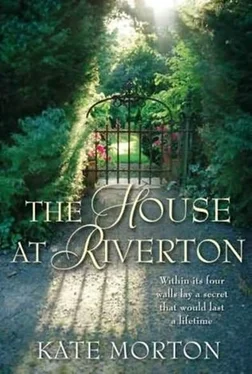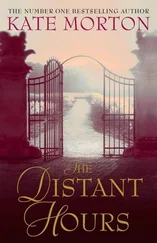If I were honest, I had perceived it from the evening of his return. We had planned a little party: Mrs Townsend had baked a special supper and Mr Hamilton had received permission to open a bottle of the Master’s wine. We had spent much of the afternoon laying out the servants’ hall table, laughing as we arranged and rearranged items so that they might best please Alfred. We were all a little drunk, I think, on gladness that evening, though none more so than I.
When the expected hour arrived we positioned ourselves in a tableau of poorly pretended casualness. Expectant glances met one another as we continued to wait, ears registering every noise outside. Finally, the crunch of grave, low voices, a car door closing. Footsteps drawing near. Mr Hamilton stood, smoothed his jacket, and took up position by the door. A moment of eager silence as we awaited Alfred’s knock, and then the door was open and we were upon him.
It was nothing dramatic: Alfred didn’t rant or rave or cower. He let me take his hat and then he stood, uncomfortably, in the doorjamb as if afraid to enter. Schooled his lips into a smile. Mrs Townsend threw her arms around him, dragging him across the threshold as one might a resistant roll of carpet. She led him to his seat, guest of honour to Mr Hamilton’s right, and we all spoke at once, laughing, exclaiming, recounting events of the past two years. All except Alfred, that is. Oh, he made a stab at it. Nodded when required, provided answers to questions, even managed another strangled smile or two. But they were the responses of an outsider, of one of Lady Violet’s Belgians, contriving to please an audience set on including them.
I was not the only one to notice. I saw the tremors of unease pulling at Mr Hamilton’s brow, an unwelcome knowledge arranging itself on Myra’s. But we never spoke of it, never came closer than the day the Luxtons came to dinner, the day Miss Starling offered her ill-received opinions. That evening, and the other observations I made since his arrival, were left to lie dormant. We all picked up the slack and remained complicit in an unspoken pact not to notice things had changed. Times had changed and Alfred had changed.
‘Grace!’ Mr Hamilton looked up from the bench as I reached the bottom of the stairs. ‘It’s half-four and there’s not a place card to be seen on the dining table. How do you imagine the Master’s important guests would fare without place cards?’
I imagined they’d find themselves a place much more to their liking than the one they’d been assigned. But I was not Myra, had not yet learned the art of standing up for myself, so said, ‘Not very well, Mr Hamilton.’
‘Not very well indeed.’ He thrust a stack of place cards and a folded table plan into my hands. ‘And Grace,’ he said as I turned to leave, ‘if you happen to see Alfred, do ask him if he’d be so kind as to find his way back downstairs. He hasn’t even started on the coffee pot.’
In the absence of a suitable hostess, Hannah, much to her amused vexation, had been given the duty of assigning places. Her plan was hastily sketched on a sheet of lined notepaper, jagged along the edges where it had been torn from a book of similar sheets.
The place cards themselves were lettered plainly: black on white, the Ashbury crest embossed on the upper left corner. They lacked the flair of the Dowager Lady Ashbury’s cards but would serve the purpose well enough, matching the comparatively austere table setting favoured by Mr Frederick. Indeed, to Mr Hamilton’s eternal chagrin, Mr Frederick had elected to dine en famille (rather than in the formal à la Russe style to which we were accustomed) and would be carving the pheasant himself. Though Mrs Townsend was aghast, Myra, fresh from her stint outside the house, quietly approved the choice, noting that the Master’s decision was surely calculated to suit the tastes of his American guests.
It was not my place to say, but I preferred the table in its more modern manner. Without the tree-like epergnes, pregnant with their overloaded salvers of sweetmeats and tizzy fruit displays, the table had a simple refinement that pleased me. The stark white of the cloth, starched at each corner, the silver lines of cutlery and sparkling clusters of stemware.
I peered closer. A large thumbprint blotted the rim of Mr Frederick’s champagne flute. I puffed a hot breath onto the offending mark and rubbed at it quickly with a bunched corner of my apron.
So intent was I on the task that I jumped when the door from the hall swung forcefully inwards.
‘Alfred!’ I said. ‘You frightened me! I almost dropped a glass!’
‘You shouldn’t be touching them,’ Alfred said, a familiar frown settled on his forehead. ‘Glasses are my duty.’
‘There was a print,’ I said. ‘You know what Mr Hamilton’s like. He’d have your guts for garters if he saw. And Mr Hamilton in garters is something I hope never to see!’
An attempt at humour destined for failure before it was made. Somewhere in the trenches of France Alfred’s laughter had died, and he could only grimace. ‘I was going to polish them later.’
‘Well,’ I said, ‘now you won’t have to.’
‘You needn’t keep doing that.’ His tone was measured.
‘Doing what?’
‘Checking up on me. Following me around like a second shadow.’
‘I’m not. I was just laying the place cards and I saw a fingerprint.’
‘And I told you, I was going to do it later.’
‘All right,’ I said quietly, setting the glass back in place. ‘I’ll leave it.’
Alfred grunted his gruff satisfaction and pulled a cloth from his pocket.
I fiddled with the place cards though they were already straight, and pretended not to watch him.
His shoulders were hunched, the right raised stiffly so that his body turned from me. It was an entreaty for solitude, yet the cursed bells of good intentions rang loudly in my ears. Maybe if I drew him out, learned what was bothering him, I could help? Who better than me? For surely I had not imagined the closeness that had grown between us while he was away? I knew I had not: he had said as much in his letters. I cleared my throat to speak, proceeded softly to say: ‘I know what happened yesterday.’
He gave no appearance of having heard, remained focused on the glass he was polishing.
A little louder: ‘I know what happened yesterday. In the drawing room.’
He stopped, glass in hand. Stood very still. The offending words hung like fog between us and I was struck by an overwhelming wish to retract the utterance.
His voice was deathly quiet. ‘Little miss been telling tales, has she?’
‘No-’
‘Bet she had a good laugh about it.’
‘Oh no,’ I said quickly. ‘It wasn’t like that. She was worried about you.’ I swallowed, dared to say: ‘ I’m worried about you.’
He looked up sharply from beneath the lock of hair his glass-shuffling had worked loose. His mouth was etched with tiny angry lines. ‘Worried about me?’
His strange, brittle tone made me wary, yet I was seized by an uncontrollable urge to make things right. ‘It’s just, it’s not like you to drop a tray, and then you didn’t mention it… I thought you might be frightened of Mr Hamilton finding out. But he wouldn’t be angry, Alfred. I’m sure of it. Everyone makes mistakes sometimes in their duties.’
He looked at me, and for a moment I thought he might laugh. Instead, his features were contorted by a sneer. ‘You silly little girl,’ he said. ‘You think I care about a few cakes ending up on the floor?’
‘Alfred-’
‘You think I don’t know about duty? After where I’ve been?’
‘I didn’t say that-’
‘It’s what you’re thinking though, isn’t it? I can feel you all looking at me, watching me, waiting for me to make a mistake. Well, you can stop waiting and you can keep your worrying. There’s nothing wrong with me, you hear? Nothing!’
Читать дальше












